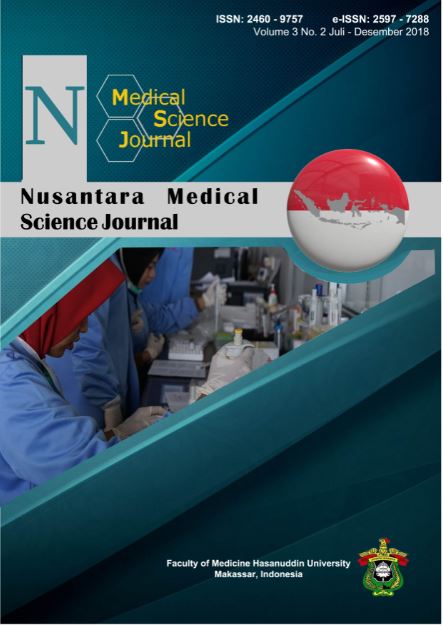ANALYSIS FACTORS OF PSYCHOSOCIAL STRESS IN PREGNANCY
DOI:
https://doi.org/10.20956/nmsj.v3i2.5775Keywords:
psychosocial stress, pregnancy womenAbstract
The Pregnancy period begins from conception until birth. It is hard to figure out if the pregnancy will get any problem. The process will involve emotional, physical and social alteration in the family. Until now,the maternal emotional condition, psychosocial stress are rarely to watch over by medical practisioners meanwhile at some study said that maternal psychosocial stress influence the outcome of baby. The aim of this study to analyze some factors that is associated to psychosocial stress in pregnancy women. This was a cross-sectional study of collected by using questionaires, were comprised of 11 questions using likert-scales, then using bivariat analysis by t-test and chi square to evaluate the sample characteristic at teaching hospital Hasanuddin University in 2015. There are 158 pregnant woman, shows who are in the age of 26,25 ± 6,319, suffer from stress, who are in their gestasional age of 30,63 ± 9,164 weeks will be going through the high level of stress. The age of pregnant women and their gestasional age in this study do not influence significantly toward psychosocial stress. Social economic factors such as level of education, occupation, and parity influence the pregnant women psychosocial stress level.
References
Affandi B. Kehamilan Normal. In: A.B S, editor. Pelayanan Kesehatan Maternal dan Neonatal. 4th ed. Jakarta: Yayasan Bina Pustaka Sarwono Prawirohardjo; 2006.
Alder J, NF, Bitzer J, Hosli I, Holzgreve W. Depression and anxiety during pregnancy: A risk factor for obstetric, fetal and neonatal outcome? A critical review of the literature. The Journal of Maternal-Fetal and Neonatal Medicine. 2007;3th(20):189-209.
M.Woods S, L.Melville J, Guo Y, Fan MY, Gavin A. Psychosocial stress during pregnancy. American Journal of Obstetrics & Gynecology. 2010; 202th:61e1-7.
Pieter H.Z, Lubis N.L. Pengantar Psikologi untuk Kebidanan. Jakarta. 2008. p. 218-43.
Rondo P, Ferreira R, Nogueira F, Ribeiro M, Lobert H, Artes R. Maternal psychological stress and distress as predictors of low birth weight, prematurity and intrauterine growth retardation. European Journal of Clinical Nutrition. 2003;57:266-72.
Hobel C, Culhane J. Role of Psychosocial and Nutritional Stress on Poor Pregnancy Outcome. American Society for Nutritional Sciences. 2003;133rd:1709s-17s.
Neggers Y, Goldenberg R, Cliver S, Hauth J. The relationship between psychosocial profile, health practices, and pregnancy outcomes. Acta Obstetricia et Gynecologica. 2006;85th:277-85.
Tegethoff M, Greene N, Olsen J, Meyer AH, Meinlschmidt G. Maternal Psychosocial Stress during Pregnancy and Placenta Weight: Evidence from a National Cohort Study. Plos One. 2010; 5th(12): 1-7.
Bullock LF, Mears JL, Woodcock C, Record R. Retrospective study of the association of stress and smoking during pregnancy in rural women. Addictive Behaviours. 2001;26th:405-13.
Mulder EJH, Medina PGRd, Huizink AC, Bergh BRHVd, Buitelaar JK, Visser GHA. Prenatal maternal stress: effects on pregnancy and (unborn) child. Early Human Development. 2002; 7th: 3-14.









